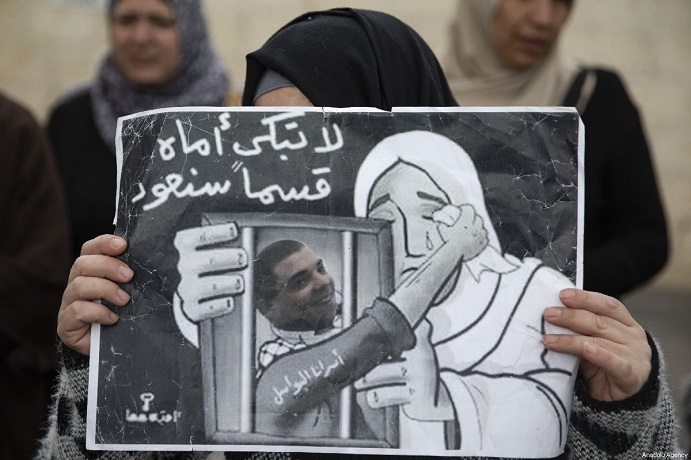
Middle East Monitor / October 1, 2019
The torture suffered by Palestinian prisoner Samer Arabeed at the hands of Israel’s Shin Bet interrogators has proved, once again, that the prohibition of such treatment as enshrined in the Fourth Geneva Convention, the Rome Statute and the UN Convention Against Torture is little more than a series of reference points used by human rights groups as reminders to the torturers.
Arabeed was transferred to Hadassah Hospital following intensive torture after being arrested for his alleged involvement in a bombing attack in August. A statement by the Prisoner Support and Human Rights Association, Addameer, mentioned that Israel admitted to having used “extreme and exceptional techniques in interrogations that actually amount to torture.”
Israel’s Justice Ministry has announced an investigation to decide whether criminal proceedings should be instigated against the Shin Bet officials. Arabeed’s torture resulted in broken ribs and loss of consciousness. His situation is now life-threatening and he is on a life-support machine. His family and lawyer were notified belatedly of his transfer from prison to hospital.
Last July, Palestinian prisoner Nasser Taqatqa died following torture and interrogation at the hands of Shin Bet. Testimonies from former Palestinian prisoners testify to the fact that torture is used systematically by Israeli interrogators. In 2013, Arafat Jaradat died under torture while detained in Megiddo Prison.
In November 2018, Israel’s High Court ruled in favour of torture if the Palestinian detainee is a member of “a designated terrorist organisation”, involved in armed resistance or if there are no other means to obtaining information. If Israel has self-established such immunity, how is it expected that the constant referencing of international laws and conventions will be enough to halt the torture of Palestinian prisoners?
In laying down the specifics on the prohibition of torture, the international community absconded from accountability in order to make human rights profitable for the perpetrators and a labyrinth of dead ends for the victims. Between these polarities, human rights organisations have tasked themselves with upholding principles in place of governments, yet their limited potential or, in some cases, partial agendas, have failed to implement any viable system of justice.
Israel is well aware of this dissonance and it exploits the absence of accountability to manipulate what constitute acceptable means of interrogation tactics. The international community’s complete marginalisation of Palestinians when it comes to their rights has facilitated Israel’s constant normalisation of torture, in full breach of international law, without as much as a collective condemnation.
The result is a permanent severing between information dissemination and the kind of legal recourse which would provide Palestinian prisoners with the chance of justice. Human rights organisations like Addameer are forced into an unwitting collaboration with diplomacy, navigating endless and repetitive cycles to raise awareness, which is what the international community intended in the first place when it failed to uphold accountability.
Calling for Arabeed’s release will not be the end of Israel’s predatory violence. It is a preventive step against further torture, yet behind this story there are several others which have escaped the meagre media attention that catapults the victims’ names, albeit briefly, into the headlines. Addameer alone cannot accomplish justice for Palestinian prisoners. At the very least, there must be a collective global approach to expose the international community’s complicity in torture and its fraudulent human rights agenda.
Ramona Wadi is an independent researcher, freelance journalist, book reviewer and blogger; her writing covers a range of themes in relation to Palestine, Chile and Latin America.












